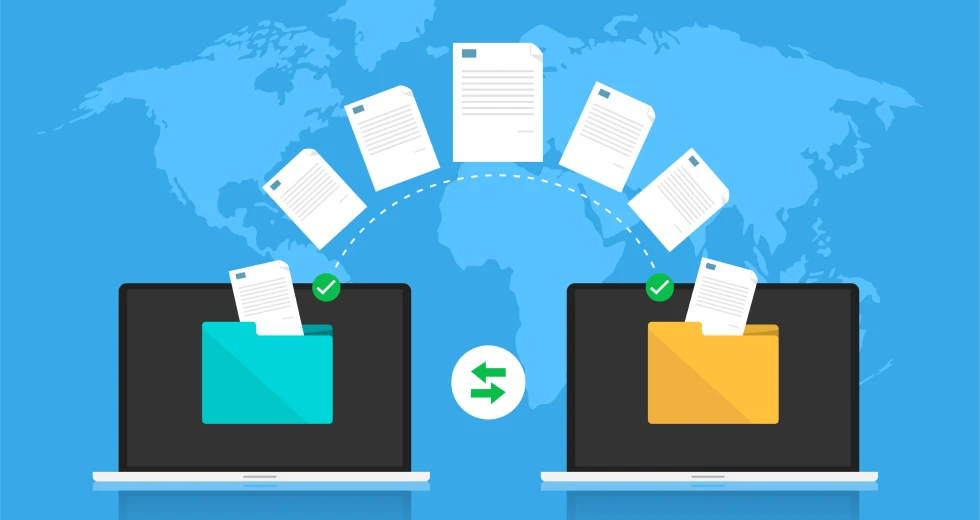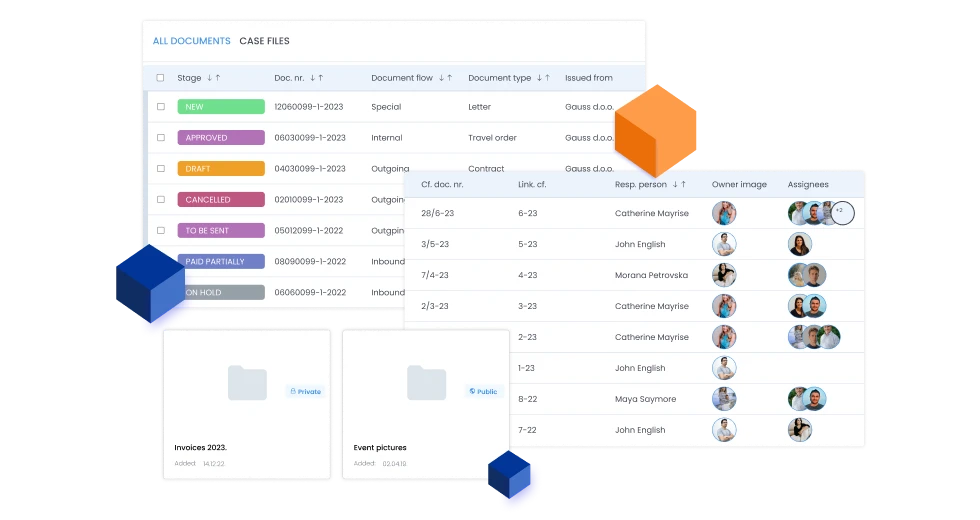TABLE OF CONTENTS:
- What is a Document Management System (DMS)?
- History
- DMS Usage Around the World
- Laws Potentiating DMS Usage
- Benefits of DMS in Digitalization
What is a Document Management System (DMS)?
In the era of digitization, managing vast amounts of documents efficiently and securely is crucial for organizations. Document Management System (DMS) has emerged as a vital tool for businesses seeking to enhance productivity, optimize workflows, and promote sustainability by reducing paper consumption.
DMS is a comprehensive software solution that enables organizations to store, organize, retrieve, and manage documents and files in a centralized and secure digital repository.
It goes beyond simple storage, offering features like version control, collaboration tools, access controls, indexing, and full-text search capabilities. DMS provides a user-friendly interface that facilitates seamless navigation and efficient document retrieval.
History
In the early 1980s, the term "Document Management" was coined, and the first DMS software solutions began to emerge.
These early systems focused primarily on document storage and retrieval in response to the growing volume of paper-based documents in offices.
The earliest DMS solutions were often simple, standalone applications that allowed organizations to scan and store documents electronically. However, due to the limited technology of that time, the adoption of DMS remained relatively low.
It wasn't until the late 1990s and early 2000s, with advancements in computing power and the widespread adoption of the internet, that DMS began to gain more significant traction. The introduction of cloud computing and more sophisticated software capabilities transformed it into the comprehensive, feature-rich solutions we know today. Despite its early inception, it remained a niche concept for quite some time.
Only in recent years, with the digital transformation of businesses and the need for efficient document management, has DMS become a standard tool in various industries.
DMS Usage Around the World
Document Management Systems have gained immense popularity across various industries and sectors worldwide. From multinational corporations to small businesses, educational institutions to government agencies, many organizations have embraced DMS to streamline their operations.
In developed countries like the United States, Canada, and the European Union, DMS adoption is widespread across all sectors.

Emerging economies, such as India, China, and Brazil, are also witnessing a significant uptake of DMS as businesses recognize its value in driving efficiency and compliance.
Document management key statistics according to Pericent, CPA Practice Advisor, CyberCrime Magazine:
- Fortune
500 companies in total lose an average of $12 billion per year due to
inefficiency caused by unstructured document management.
- 45%
of small-sized businesses still rely on traditional paper-based document
management.
- 11%
of small-sized businesses have no document management system in place.
- 45%
of companies spent at least 1 week to have a contract signed.
- By 2025., the world will store 200 zettabytes of data.
According to a survey by AIIM (Association for Intelligent Information Management), 73% of organizations believe their conversion to a digital-first strategy is essential. The global Document Management System market is projected to reach USD 6.78 billion by 2026., growing at a CAGR of 11.17% during 2021-2026. (Market Study Report LLC).
Laws Potentiating DMS Usage
Several legal frameworks support and promote the adoption of Document Management Systems:
- Data
Protection and Privacy Laws: Regulations like GDPR (General Data Protection
Regulation) in the EU and CCPA (California Consumer Privacy Act) in the United
States highlight the need for secure and compliant document management.
- Electronic
Signature Laws: Acts like the ESIGN Act (United States) and eIDAS (European
Union) legally recognize electronic signatures, paving the way for fully
digitized document workflows.
- Digital Archiving Laws: Countries like Brazil and Japan have established laws regarding the validity and retention of digital documents, encouraging organizations to adopt DMS.
Benefits of DMS in Digitalization
Adopting Document Management Systems (DMS) brings many benefits that empower organizations to efficiently manage, secure, and leverage their vast troves of digital documents.

Here are some:
- Improved
Efficiency: DMS streamlines document-related processes, reducing manual tasks,
and automating workflows. This results in enhanced productivity and quicker
decision-making.
- Security
and Compliance: DMS ensures robust security measures like encryption, access
controls, and audit trails. It helps organizations meet regulatory compliance
standards such as GDPR, HIPAA, and ISO 27001.
- Disaster
Recovery: By storing documents in a centralized and redundant manner, DMS
protects critical data from loss due to natural disasters or hardware failures.
- Cost and Space Savings: Adopting DMS reduces paper usage, printing costs, and physical storage space, leading to cost-efficient operations and eco-friendly practices.
DMS offers businesses a wide array of compelling benefits that can transform their document-related processes and drive success in the digital age. From enhanced efficiency and collaboration to fortified security and compliance, DMS streamlines operations, saves costs, and empowers organizations to stay agile, productive, and competitive. Implementing a DMS system is not just a technological upgrade but a strategic decision that paves the way for a more sustainable, organized, and future-ready business landscape.

Why Gauss Box?
Any company that needs to be highly organized will receive value from electronic document management.
Gauss Box DMS business solution is a tool within the Gauss Box platform that enables seamless digitalization of existing documents, creation of new ones, and efficient organization and tracking of business records.
Try the tool for free and contact us for any questions.
